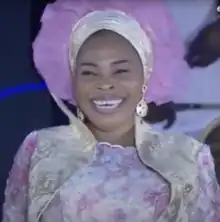Tope Alabi
Tope Alabi ⓘ(born 27 October 1970) in Ogun, a Nigerian gospel singer,[1] film music composer[2] and actress.[3] She is also known as Ore ti o common and as Agbo Jesu.[4][5] Tope Alabi obtained a Higher National Diploma in Mass Communication from the polytechnic of Ibadan, after graduating in the year 1990, she worked as a correspondent at NTA (Nigerian Television Authority) in Ibadan. She started singing at the younger age, when she joined the choir in her local Catholic church at the age of seven.[6] Tope has ability to produce different traditional and modern beats.[7][8] She had composed and released several songs and couple with Christian slangs that made her different.[9]
Tope Alabi | |
|---|---|
 | |
| Born | 27 October 1970 Lagos, Nigeria |
| Education | Polytechnic Ibadan |
| Occupation(s) | Gospel singer, actress, film music composer |
| Known for | Gospel music |
| Children | 3 |
Biography
Tope Alabi was born on 27 October 1970 in Lagos State,She was born into the family of Pa Joseph Akinyele Obayomi and Madam Agnes Kehinde Obayomi. She is the only daughter out of the three children in the family.She is married to Soji Alabi. She hails from Yewa, Imeko of Ogun State, Nigeria. She obtained her West Africa School Certificate from Oba Akinyele Memorial High School, Ibadan, 1986. Thereafter, she proceeded to the Polytechnic Ibadan where she studied Mass Communication and graduated in 1990.[10]
Alabi was formerly a member of the Jesters International comedy group.[11] She later worked with other popular traveling and stage theater groups in both Ibadan and Lagos. She made films in the Yoruba film genre of Nigeria.[12] Tope Alabi later changed her focus to gospel music after she became a born-again Christian.[13] On 21 May 2019, Nigerians on Twitter crowned Tope Alabi the queen of Yoruba language as a result of a competition by United Bank for Africa on their 70th-anniversary celebration.[14][15]
On 13 June 2021, she came under criticism for her comments on a song titled Oniduro Mi, which sparked outrage amongst other gospel artists.[16]
Discography
- Ore ti o Common (2001)
- Iwe Eri (2003)
- Agbara Re NI (2005)
- Agbara Olorun (2006)
- Angeli MI (2007)
- Kokoro Igbala (2008)
- Kabiosi (2010)
- Moriyanu
- Agbelebu (2011)
- Alagbara (2012)
- Agbelebu (2013)
- Oruko Tuntun (2015)
- Omo Jesu (2017)
- Yes & Amen (2018)
- Spirit of Light (TY Bello) (2019)
- Olorun Nbe Funmi (Iseoluwa)
- Eruretoba (TY Bello)
- Adonai (TY Bello)
- Awa Gbe Oga (TY Bello)
- Angeli (TY Bello)
- No One Else (TY Bello)
- Oba Mi De (TY Bello)
- Olowo Ina (TY Bello)
- War (TY Bello)
- Lowo Olorun Lowa(2020)
- Unless You Bless Me(2022)
- Igbowo Eda (2023)
References
- Shepherd, John; Laing, Dave (2003). Continuum encyclopedia of popular music of the world, Volumes 3-7. Continuum. p. 171. ISBN 978-0-8264-7436-0.
- Adeyemi, S. T. (2004). "The Culture Specific Application of Sound in Nigerian Video Movies". Nigerian Music Review. University of Ife. 5: 51–61. ISSN 1116-428X. OCLC 5386079.
- Adebayo, Bose (26 July 2008). "I Was in Labour for Four Days for My Second Baby-Tope Alabi". Vanguard. Retrieved 19 October 2009.
- "Biography". Tope Alabi. Retrieved 6 December 2010.
- "Listen: "Logan Ti Ode" by Tope Alabi Featuring Ty Bello". guardian.ng. 31 October 2018. Retrieved 22 March 2019.
- Stets, Regina (30 October 2020). "Tope Alabi bio: The inspiring biography of the gospel singer". Legit.ng - Nigeria news. Retrieved 11 March 2023.
- "Tope Alabi Biography, Profile, History, Latest Music, Songs & News - NaijaGists.com - Proudly Nigerian DIY Motivation & Information Blog". 22 October 2012. Retrieved 11 March 2023.
- NG, Youth Village (23 March 2016). "10 Things You Didn't Know About Tope Alabi". Youth Village Nigeria. Retrieved 11 March 2023.
- Babatunde (16 September 2022). "Full List Of Tope Alabi Albums And Songs". Retrieved 11 March 2023.
- "Tope Alabi". Naija.ng - Nigeria news. Retrieved 24 May 2018.
- ""I Loved To Reveal My Boobs" - Tope Alabi". Nigeria Films. 14 June 2008. Retrieved 19 October 2009.
- Alonge Michael (6 July 2009). "Tope Alabi on nine month's course". ModernGhana.com. Retrieved 19 October 2009.
- Ajibade, George Olusola (2007). "New Wine in Old Cups: Postcolonial Performance of Christian Music in Yorùbá Land". Studies in World Christianity. Edinburgh University Press. 13 (2): 105–126. doi:10.1353/swc.2007.0014. ISSN 1354-9901.
- "Tope Alabi Biography |Profile |FabWoman". FabWoman | News, Style, Living Content For The Nigerian Woman. 27 October 2020. Retrieved 23 March 2021.
- "#CommentSection: Tope Alabi crowned luminary of Yoruba artistry at #UBAAt70 yk". Oak TV Newstrack. Oak Tv. 21 May 2019. Retrieved 25 June 2019.
- "Wetin Tope Alabi tok about di song 'Oniduromi' and how pipo react". BBC News Pidgin. Retrieved 1 January 2022.